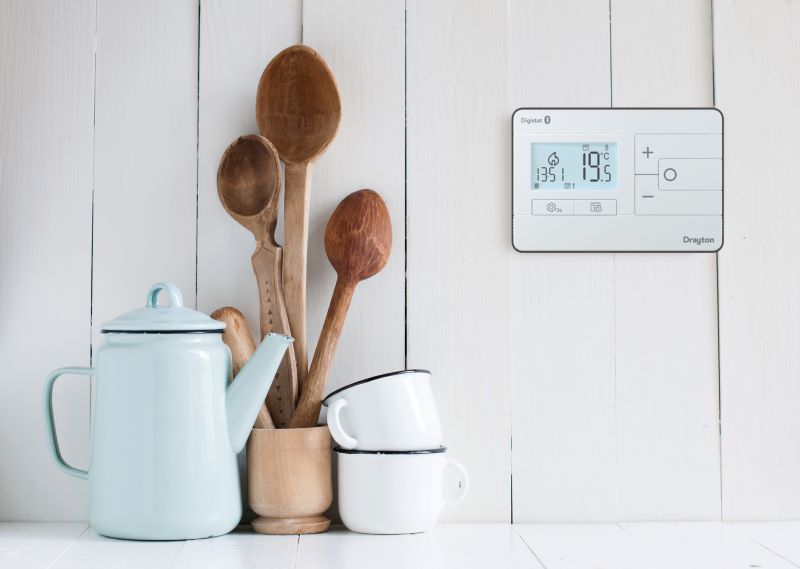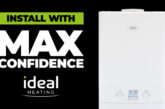
As homeowners continue to lean on technology to manage their home’s energy, many are turning to heating engineers to find out if smart controls can help to save energy and cut costs. However, smart controls are not a one-size fits all solution, and there are some circumstances where they may not be suitable. Here, Merlin Milner, Product Owner for Water-based Systems at Drayton, discusses how Bluetooth-enabled controls offer an alternative for people keen to achieve energy efficiency.
As a result of continued environmental efforts and to drive the cost of bills down, today’s homeowner is becoming used to adopting technology to manage their home’s energy consumption. Smart heating controls have rapidly developed to support homeowners in achieving cost-savings, convenience and comfort, all-in-one.
Although, while smart heating controls are an increasingly popular choice, they may not offer an effective solution to everyone, so alternatives should not be overlooked.
There are a range of reasons why smart heating controls may not be the best option, such as issues surrounding internet connectivity, accessibility, or simply, disinterest in creating a ‘smart home’. With this in mind, its vital that heating engineers offer an alternative for customers who are looking to drive down bills and do their bit for the planet, equally.
This is where a Bluetooth-enabled control, such as Drayton’s Digistat, comes in, offering a reliable choice. Such a device is likely to be more widely understood given Bluetooth’s longevity and simplicity.
Achieving cost savings
Smart controls, while useful, can sometimes be costly, and those looking to save money on energy costs may not be in a position to prioritise an investment in a smart heating system.
A Bluetooth-enabled device is a perfect alternative here, as customers can still make cost-savings by optimising their energy usage, without the significant investment required of smart heating controls, given that they generally cost less.
Even at a smaller cost, a Bluetooth-enabled control, like Drayton’s Digistat, can offer smart modes to optimise efficiency, controlled via the Wiser Home app for convenience. For instance, Timed Away Mode and Delayed Start offer reductions in energy use of up to 14% and 10% respectively.
Timed Away Mode works by allowing the user to set their heating to turn off for a set period of time, whilst they take a trip away, for example. While Delayed Start works automatically by delaying start times, intuitively adapting the pre-set schedule and optimising energy use by learning the thermal characteristics of the home and taking into account external temperatures.
Additionally, the Digistat features ON/OFF load compensation, which saves 10% of energy use compared to thermostats without this. Alternatively, enabling OpenTherm modulation enhances the performance of heating systems, generating a 12% reduction in energy use.
Keeping it simple
Cost savings aren’t the only benefit to choosing Bluetooth options, but the simplicity is a key advantage too – benefiting both the heating engineer installing the control and the homeowner using them.
Installation and commissioning can all be done via the thermostat, without having to access the homeowners Wi-Fi network in order to obtain a successful connection. This saves a lot of time which means the homeowner can be set-up and ready to enjoy the convenience the control offers in no time.
Also, with a simple connection and easy navigation an installer can move on to the next job that bit quicker, and they can rest assured that the control is simple enough for their customer to use and understand – either on the thermostat or via the app – cutting call backs.
Reliability
A recent Ofcom report found that over 1.5 million households don’t have access to the internet. However, this shouldn’t mean they should miss out on the multiple benefits of heating controls, such as reduced consumption and outgoings.
Using Bluetooth-enabled solutions can offer reliability to homeowners because they work without the need for an internet connection. Therefore, those in homes that don’t have internet won’t have to worry about their heating control failing.
Rental properties
Bluetooth-enabled controls can be a reliable option for those who may not want to introduce connected devices into the home, given that there is no need to connect them to the home’s Wi-Fi network.
With this in mind, Bluetooth-enabled heating controls are an ideal solution for properties owned by private landlords or housing associations, given that there may be a more frequent turnover of occupancy. As Bluetooth-enabled devices rely solely on Bluetooth connection, which is short-range, the connectivity is lost when the property is vacated. In short, once a tenant has left the property, they are no longer able to access the heating system and make changes to it.
While many households are looking to smart controls to better manage their homes and heating, it is essential that alternatives are offered to those who may want to explore other options. Many homeowners, landlords, and housing associations will have their reasons for opting for a Bluetooth-enabled solution to save money, avoid smart technology, or connectivity issues. Therefore, it is recommended that heating engineers learn more about heating controls that can offer optimisation, beyond what smart heating controls provide, to better serve their customers.













